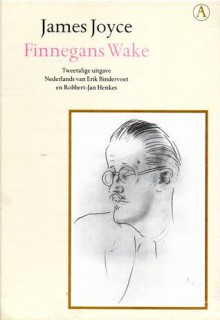
Why you will read Finnegans Wake:
The short of it is this: have a think about all your greatest achievements, the accomplishments you’re most proud of. What they have in common is hard work and originality. Read Finnegans Wake. Fine, you know what? If you’re even in this review for the short term, chances are you won’t read it. If anyone’s still interested, please let me convince you further.
Michael Chabon, Pulitzer-prize winning author, wrote a big article for The New York Review of Books on why he wasn’t going to try and read Finnegans Wake any more, and quite frankly it’s the proudest I’ve ever heard someone sound for not having read a book. If that strikes you as odd too, maybe it’s time you too picked up a copy of Joyce’s 17-year distilled puntastic masterpiece. No sooner do you enter the book that you realise you’ll be here for a while. Your reading slows down every time you hit an unfamiliar word: perhaps it’s in one of the sixty to seventy languages that appear in the Wake, or maybe it’s a Joycean triple-pun, but when whatever they are is every second word in the book, it can feel like you’re reading treacle.
Yes, a lot of it is nonsense, and if I wrote a 600+ page book consisting mostly of words that were invented, I would judge anyone who wanted to read it, but you and I didn’t write it, the greatest author of the 20th century wrote it, so don’t worry: it comes preapproved. It’s like that third Bloc Party album that made you turn your nose up the first listen, but somehow you knew you’d get into it if you persevered, the only difference is that with the Wake you’d be right.
Also, Finnegans Wake is the ace up the sleeve of a surprising number of authors. After a few months spent with the Finnegans, maybe you’ll pick up Lolita and say “Hang on a minute: that pun’s a bit familiar”(1) , perhaps it’s Arundhati Roy’s The God of Small Things that makes you think “Hm, language as rhythm… Not her idea!” , or you could find yourself raising your eyebrow knowingly at the latest Zadie Smith. It has been said that nobody reads FW any more, and it’s absolutely true. As a result, a lot of writers are having an “originality” field day with it. But you and I will know their secret!
Finnegans Wake, not Finnegan’s, the wake of many a Finnegan, Finnagain and Finnomore, is a cyclical hallucination of a book.
Let Joyce himself tell you the story of two washerwoman having a chat, one slowly turning to stone and the other to an elm tree as night approaches, read the longest story ever written about a man passing out drunk in his own bar, feel characters blending and dissolving then budding off from each other once again in a dark rainy dream, hear the thunder in Joyce’s 100 letter words.
Our hapless hero H.C. Earwicker, also known as Heinz cans everywhere and most appropriately Here Comes Everybody, is everyone. He’s ready to be you, too, even after all this time, if you give the Wake a chance. So pick it up, take it slowly, read it aloud, forget what you know about the novel and enjoy the music of the words. What does it mean? Three answers: nothing, we’ll never know, and whatever you want.
(1) Incidentally, Vladimir Nabokov said that Finnegans Wake was "nothing but a formless and dull mass of phony folklore, a cold pudding of a book, a persistent snore in the next room [...] and only the infrequent snatches of heavenly intonations redeem it from utter insipidity.” Oh please! Could he be more jealous?


 Log in with Facebook
Log in with Facebook 








